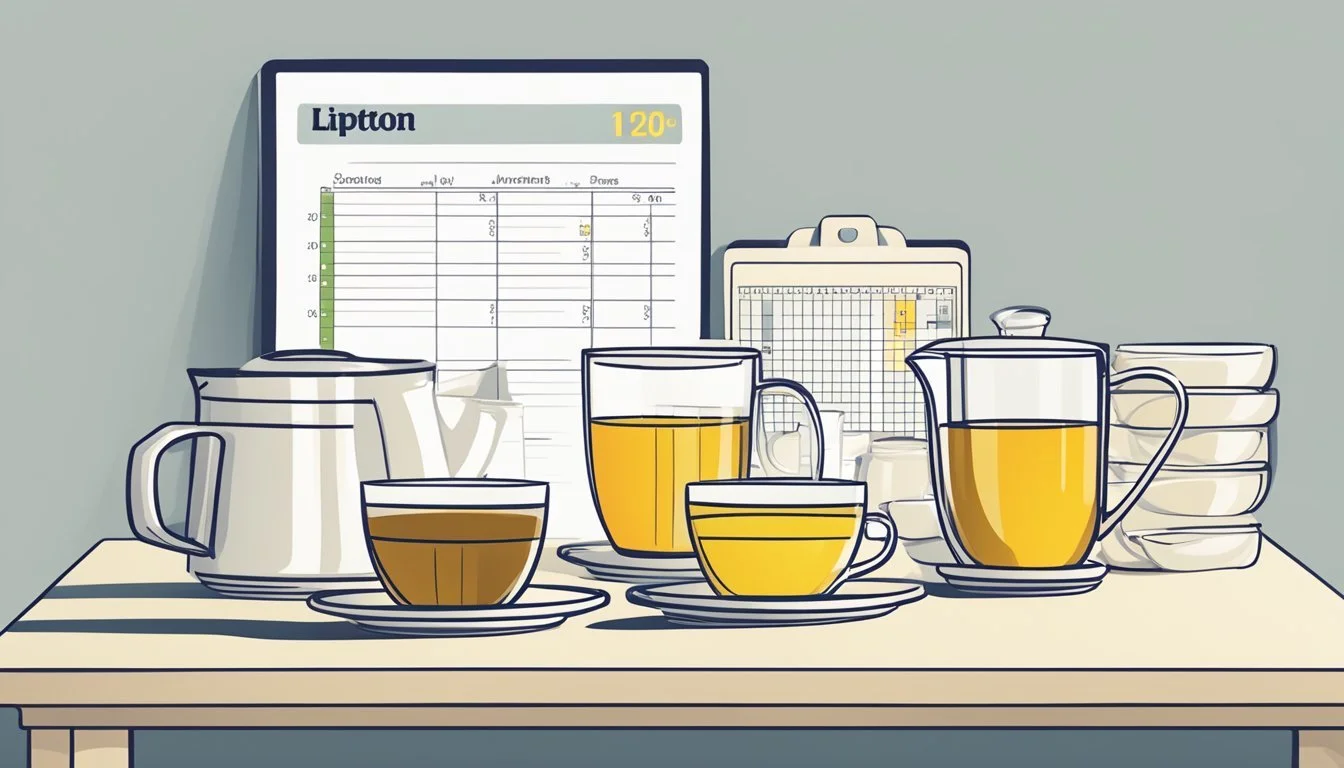How Many Cups of Lipton Tea Per Day Constitute Overconsumption?
Determining the optimal daily intake of Lipton tea, or any tea, involves a balance between enjoying the beverage and being mindful of its caffeine content. Tea is a popular beverage worldwide and is often lauded for its health benefits, including its potential to boost antioxidants, aid digestion, and even reduce the risk of chronic diseases. However, like any source of caffeine, it's possible to consume too much.
The answer to how many cups of Lipton tea per day could be considered too much varies from person to person. Generally, most health experts suggest that moderate tea consumption, typically around 3-4 cups per day, is beneficial and does not lead to negative side effects for the average adult. Going beyond this limit, especially considering the caffeine content in black tea which Lipton commonly offers, could potentially lead to side effects such as sleep disruption, jitters, and increased heart rate.
Individual tolerance to caffeine varies, and factors including body weight, genetic makeup, medication use, and overall health can influence how much tea someone can safely drink. Therefore, while Lipton tea can be part of a healthy diet, it is crucial to consume it in moderation to avoid any adverse effects linked to excessive caffeine intake.
Understanding Tea and Its Constituents
Tea, derived from the Camellia sinensis plant, contains several compounds such as caffeine, antioxidants, and tannins, which impact health in various ways. Different types of tea such as green, black, and oolong vary in their constituents due to differences in processing.
The Role of Caffeine in Tea
Caffeine is a central nervous system stimulant found in tea leaves, and it is known for its ability to improve alertness and concentration. Lipton tea, like other black teas, typically contains between 50 to 90 milligrams of caffeine per cup. The consumption of caffeine should be moderated as excessive intake can lead to side effects such as restlessness and insomnia.
Antioxidants and Polyphenols in Tea
Tea is rich in antioxidants and polyphenols, including catechins and epigallocatechin gallate (EGCG). These substances help protect the cells from damage by neutralizing harmful free radicals. Green tea is particularly high in catechins, which are associated with various health benefits, including reduced inflammation and improved heart health.
Tannins and Their Effects on Iron Absorption
Tannins, present in tea, can bind to iron from plant-based sources and hinder its absorption in the body. Individuals with iron deficiency are advised to consume tea between meals rather than with them to minimize this effect. The tannin content is generally higher in black tea compared to other tea types.
Types of Tea and Their Health Properties
Each type of tea possesses unique health properties due to its specific nutritional profile:
Green Tea: Rich in catechins, known for antioxidant properties.
Black Tea: High in flavonoids, may support heart health.
Oolong Tea: A source of polyphenols, can aid in weight management.
Herbal Tea: Typically caffeine-free, made from various herbs, flowers, and fruits.
While Lipton green and black teas are sources of flavonoids, a balanced diet aligned with dietary guidelines is crucial for harnessing these health benefits.
Optimal Tea Consumption for Health
When considering the health implications of tea consumption, it is important to pay attention to quantity. Drinking tea can offer a variety of health benefits, but moderation is essential to avoid potential negative side effects.
Balancing Tea Intake and Nutritional Benefits
Tea, especially green tea, is lauded for its potential health benefits, including a reduced risk of certain chronic diseases. Studies suggest that health advantages can be seen with as little as one cup of green tea per day. However, to harness these benefits fully, individuals should aim to consume no more than 3-4 cups per day. This balance is crucial because excessive tea consumption might lead to nutrient deficiencies, such as iron absorption issues due to the tea's tannins.
The Interplay Between Tea and Hydration
Tea contributes to daily fluid intake and can aid in hydration. Nevertheless, the caffeine present in tea also possesses diuretic properties, which can lead to increased urine production. This paradox means that while tea is hydrating, one should not rely on it solely for their hydration needs. Moderation is key, and incorporating other sources of hydration, particularly water, is essential to maintain proper bodily function.
Herbal Teas as Caffeine-Free Alternatives
For individuals sensitive to caffeine or those seeking to limit their caffeine intake, herbal teas offer a great alternative. These teas are naturally caffeine-free and can provide varied health benefits depending on the herbs used. For instance, chamomile tea is often associated with relaxation, while peppermint tea is known for aiding digestion. Herbal teas can be consumed in greater quantities compared to caffeinated tea, as they do not contribute to caffeine-related side effects.
Potential Health Benefits of Tea
Tea, including varieties like Lipton, is celebrated for its potential health benefits ranging from metabolic enhancement to cognitive function support. These benefits stem from the beverage's rich composition of bioactive compounds.
Tea's Influence on Metabolism and Weight Loss
Tea contains compounds that can boost metabolism and assist in weight loss. For example, the catechins found in green tea have been shown to promote fat oxidation, which may lead to a reduction in body fat over time. Regular consumption of tea can also augment energy expenditure, thereby enhancing metabolic rate.
Cognitive Function and Memory Enhancement
Tea's caffeine and the amino acid L-theanine are believed to have synergistic effects that improve aspects of cognitive function, including enhanced attention and alertness. Furthermore, some studies suggest a potential relationship between tea consumption and a reduced risk of cognitive decline.
Cardiovascular Health and Blood Pressure Regulation
Regular tea consumption has been linked to improved cardiovascular health. Antioxidants in tea, such as flavonoids, may help to reduce inflammation, lower cholesterol levels, and assist in blood pressure regulation. These factors are integral to the prevention of heart disease.
Cancer Prevention and Antioxidant Activity
Tea is rich in antioxidants, which protect cells from damage by free radicals. These antioxidants, including epigallocatechin gallate (EGCG), have been studied for their potential role in cancer prevention. Their anti-inflammatory properties may also contribute to inhibiting the development of certain cancers.
Identifying Risks and Side Effects of Overconsumption
While Lipton tea is enjoyed by many for its flavor and potential health benefits, it's important to be aware of the risks and side effects associated with consuming it in excessive amounts.
When Tea Consumption Becomes Excessive
Excess tea consumption occurs when individuals drink more than the recommended 3-4 cups per day. While the precise amount may vary depending on individual tolerance, consistently exceeding this limit can lead to negative health consequences.
Side Effects Associated with Too Much Tea
Health Impacts:
Increased heartburn and acid reflux
Potential for iron deficiency due to tannins binding to iron in the digestive system
Digestive System:
Nausea
Digestion issues
Physical Side Effects:
Headaches
Dizziness
Insomnia and restlessness
Understanding Caffeine Dependence and Withdrawal
Dependence: Regular overconsumption of tea can lead to caffeine dependence, characterized by a need for caffeine to function normally.
Withdrawal Symptoms:
Headaches
Fatigue
Mood fluctuations
Tea and Its Impact on Sleep and Anxiety
Consuming high amounts of tea, especially later in the day, can lead to poor sleep or trouble sleeping due to caffeine content.
Excessive caffeine may also exacerbate anxiety and stress, contributing to a cycle of restlessness and adverse sleep patterns.
Tea Consumption Guidelines for Special Populations
Special populations such as pregnant women, individuals with diabetes, and those with cardiovascular conditions, need to be particularly mindful of their tea intake. The following subsections outline the safe limits of tea consumption and detail its effects on these groups.
Pregnancy and Lactation: Safe Limits for Tea
During pregnancy and lactation, it is critical to manage caffeine intake, as high levels can lead to complications including miscarriage. Healthcare providers generally recommend that pregnant women limit their caffeine intake to less than 200 milligrams per day. For Lipton tea, this translates to approximately 2 cups per day, given that an 8-ounce serving contains about 50 milligrams of caffeine.
Tea's Effects on Blood Sugar Control in Diabetes
Individuals with type 2 diabetes should consume tea cautiously, as it can influence blood sugar levels. While tea may have positive effects on blood sugar control, it is important to monitor blood glucose levels regularly. Specifically, tea consumption that exceeds 4 cups per day has been linked to benefits in preventing type 2 diabetes; however, this should not replace any prescribed medications or dietary recommendations.
Tea and Heart Health in Patients with Cardiovascular Conditions
For those with cardiovascular conditions, the consumption of tea may have protective effects on the heart. Tea can contribute positively to heart health by supporting blood vessels' function and potentially lowering the risk of stroke and heart disease. Yet, advice from a healthcare provider is crucial, as the caffeine and tannins present could interfere with certain heart medications or exacerbate pre-existing conditions. A moderate intake, typically defined as 1 to 3 cups of tea per day, has been associated with a lower risk of cardiovascular events.
Incorporating Tea into a Healthy Lifestyle
Incorporating tea, such as Lipton tea, into one's daily routine can be beneficial, but it's crucial to do so with an awareness of both its benefits and potential drawbacks. Moderation and mindfulness are key.
Everyday Practices for Balancing Tea Intake
To maintain a healthy lifestyle, individuals should aim for a balance in their tea consumption. Tea can be part of a daily diet, but it should not outweigh the consumption of water or contribute to the excess intake of caffeine. Nutrition experts typically recommend limiting tea intake to about 3-4 cups per day to avoid the negative effects of excessive caffeine. It’s important for individuals, especially those with chronic conditions or on certain medications, to consult with their healthcare provider to determine an appropriate amount.
Daily Limit: 3-4 cups of tea
Check for Interactions: Consult healthcare providers regarding medication and tea interactions.
Alternative Natural Sweeteners and Additives
Instead of using refined sugar or artificial sweeteners, those seeking to improve nutrition may consider natural alternatives like honey or lemon, which can enhance the taste of tea without adding unnecessary calories. These additives also provide additional health benefits: lemon for its vitamin C, and honey for its antimicrobial properties. For those following a vegan or vegetarian diet, agave syrup or stevia are suitable plant-based sweeteners.
Sweetener Options: Honey (non-vegan), lemon, agave syrup, stevia
Considerations: Opt for natural and low-calorie sweeteners to align with a healthy lifestyle.
Strategies for Reducing Tea's Negative Impacts
While tea can be a beneficial addition to a diet, there are strategies to mitigate its potential negative impacts. For individuals with iron deficiency, it is advisable to consume tea between meals to prevent tannins from inhibiting iron absorption. Additionally, reducing tea intake before bedtime can prevent caffeine from disrupting sleep. Those with a risk of chronic diseases such as osteoporosis might find the bone-supporting antioxidants in tea beneficial. However, moderation is key to preventing negative impacts like increased bleeding risk or obesity from high-calorie additives.
Timing: Drink tea between meals and avoid close to bedtime.
Quantity: Monitor intake to prevent exacerbation of chronic conditions.
Additives: Opt for low-calorie options to support weight management goals.
Recommended Daily Intake of Tea
When considering how many cups of Lipton tea one should consume daily, it's important to balance enjoyment with moderation to maintain overall health and proper hydration. Here are specific guidelines to establish a safe consumption level and the importance of personalized advice from healthcare providers.
Establishing the Maximum Number of Cups per Day
Most individuals can safely enjoy 3-4 cups of Lipton tea per day. Consuming tea in these amounts can contribute positively to hydration and offers various health benefits due to the antioxidants present in tea. However, it is crucial to consider the caffeine content; a standard cup of black tea contains about 40-70 milligrams of caffeine. Therefore, to avoid excessive caffeine intake, which can lead to increased heart rate, restlessness, or sleep disturbances, one should not exceed 300-400 milligrams of caffeine daily from all sources, suggesting an upper limit of about 5-6 cups of Lipton tea per day for most people.
Consulting Healthcare Providers for Personalized Advice
Each individual's response to caffeine and the effects of tea consumption can vary widely. Those with certain medical conditions, pregnant women, or individuals sensitive to caffeine should consume less tea and consult with their healthcare provider for personalized advice. Moreover, pre-existing conditions related to heart health and hydration levels may necessitate adjustments to daily tea intake. It's essential for individuals to seek guidance from a healthcare professional to understand the risks and optimize their daily tea consumption based on personalized health needs.
Conclusion
When discussing the consumption of Lipton tea, or any tea, moderation is key. Three to four cups a day is typically considered safe for most individuals, balancing benefits with minimal risk of side effects. Exceeding this amount could potentially lead to some negative consequences due to the caffeine content and other compounds found in tea.
Caffeine sensitivity: Individuals with lower tolerance may experience insomnia, jitters, and increased heart rate.
Iron absorption: Excessive tea drinking can interfere with the body's ability to absorb iron, leading to complications.
Gut health: While some studies suggest benefits to gut microbiome at four to six cups, exceeding this could disrupt the balance.
ItalicIt's important to listen to one's body and consider existing conditions or sensitivities. Pregnant women and those with certain health conditions should consult a healthcare provider for personalized advice.
In conclusion, individuals should aim to enjoy Lipton tea in moderation to harness its benefits without experiencing the downsides associated with high consumption levels.









